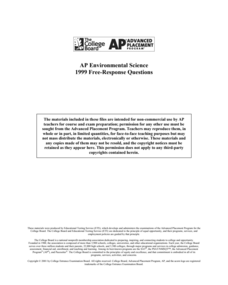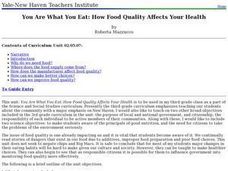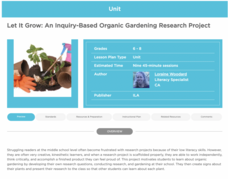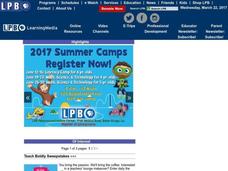Curated OER
Playing in mud puddles
Students examine the effects of rainfall on different surfaces and discuss water pollution. They review the water cycle and the uses of water in daily lifestyles. Students discuss the effects of soil run off in streams and rivers.
Curated OER
Chemistry and the Food System
In this chemistry worksheet, students review how chemistry has helped grow and preserve different foods. This worksheet has 11 fill in the blank, 3 multiple choice, and 6 short answer questions.
Curated OER
Fertilizers, Pesticides and Health
Pupils apply real data to create and calculate algebraic equations. Students create a visual to represent the concentration for one part per million and apply unit analysis to verify measurement computations. Pupils define the use of a...
Curated OER
Hazardous Waste Hot Potato
Students investigate hazardous substances. They work in groups to decide how to properly dispose of such materials..
Michigan State University
What is IPM?
Learners view a plastic cockroach, mouse, or picture of a pest and discuss if they belong inside the house or school. They discuss what a pest is and brainstorm what makes it a pest and ways to get rid of them. They then discover dangers...
Earth Day Network
Staying Green While Being Clean
Clean up the environment with a lesson that focuses on replacing hazardous cleaning supplies with green, environmentally-friendly products. Using a dirty patch of surface as a control area, kids clean other parts of various surfaces...
Curated OER
Isolation of Synthetic Chemicals from Plant Leaves
Young scholars isolate and identify a dye, which represents a synthetic pesticide, from plants.
Curated OER
Insects: Bug Off
Students design and conduct an experiment to test three organic pesticides to control ants. They view a video that demonstrates ant behavior and the role of pesticides in insect control. In small groups, they set up behavior...
Curated OER
Hazardous Household Products Word Search
In this word search learning exercise, students find fifteen words related to hazardous material in their homes. Words include pesticide, danger, flammable, warning, etc.
Illinois Department of Natural Resources
Section Two: Why is Biodiversity Important?
Explore soil, genetic traits, natural resources, and pollution in a series of lessons that focus on biodiversity. Kids complete experiments to learn more about the importance of varied genes and organisms in an ecosystem.
Teach Engineering
The Great Pacific Garbage Patch
The Great Pacific Garbage Patch is one of several garbage patches around the world where garbage accumulates naturally. As part of a GIS unit that combines oceanography, environmental science, and life science, class members investigate...
Channel Islands Film
Human Impact on the Food Web of Santa Cruz Island
What happens when a non-native species is introduced onto an island? Santa Cruz Island, part of the Channel Island chain located off the coast of southern California, provides the perfect laboratory for young environmental scientists to...
College Board
1999 AP® Environmental Science Free-Response Questions
Pollution is a real concern in most areas of Earth. A four-question AP® assessment has learners analyze data related to water pollution and air pollution as well as consider the pros and cons of recycling. Each question has several...
Curated OER
Chemicals in Your Life
In this chemicals worksheet, high schoolers fill in 61 blanks of statements comparing the chemicals used in farming and the chemicals found in medicines and food.
Curated OER
Diet: You Are What You Eat
Third graders examine the issue of food quality to assess the dangers of pesticides, additives, and improper food preparation. After keeping food diaries and categorizing foods, they fill in food pyramids based on their journal entries....
Curated OER
Potential Hazards in Your Home
High schoolers increase their awareness of the hazardous chemicals humans come in contact with, and explore less hazardous alternatives.
Curated OER
The Global Impact of Insect Borne Diseases & Agriculture
Students study the global impact of insect borne diseases, the appropriate use of pesticides, and the concept of human interrelations on a world wide scale. They examine how to safely apply a pesticide, according to the label.
Curated OER
LD50 of NaCl to Gammarus spp.
Students learn the meaning of LD50 through lecture and discussion. Through experiment, students graph and calculate the LD50 of salt on fresh water amphipods. Students compare results of the experiment with pesticides and pollutants.
It's About Time
Competition Among Organisms
Who knew plants could be so competitive? Join your class as they observe plants competing for space and nutrients. Middle and high schoolers describe possible effects of introducing a new species into an already established ecosystem,...
Virginia Department of Education
Changes in Ecosystems
How does water pollution affect the environment? Provide your class with the resources to answer this question as they learn about eutrophication and ecosystem changes. Over two weeks, they simulate the effects of pollution on the...
ReadWriteThink
Let It Grow: An Inquiry-Based Organic Gardening Research Project
How does your garden grow? An inquiry-based, organic gardening unit asks young scientists to research a vegetable or flower, create an environment for it, and then plant and tend to the seedling. Gardeners develop their own research...
Curated OER
Watersheds and Wetlands
Students investigate watersheds and wetlands. In this watersheds and wetlands lesson, students complete a 17 step lesson plan to build a watershed. Students then complete another 9 step lesson to build a watershed with wetlands and...
Curated OER
Integrated Pest Management
Students investigate the different methods used in integrated pest management. In this biology lesson, students evaluate experiments and case studies on IPM. They discuss the pros and cons of using this method.
Curated OER
How Does Your Garden Grow?
Learners explore how to use natural fertilizers and pesticides by growing an organic vegetable garden by growing plants and using a variety of soil amendments.
Other popular searches
- Pesticides Food
- Harmful Pesticides
- Pesticides and Their Harm
- Pollution Pesticides
- Comparing Pesticides
- Pesticides for the Farm
- Agriculture Pesticides
- Pesticides and the Danger
- Synthetic Pesticides
- Pesticides and Insect
- Chemical Elements Pesticides
- Herbicides and Pesticides

























